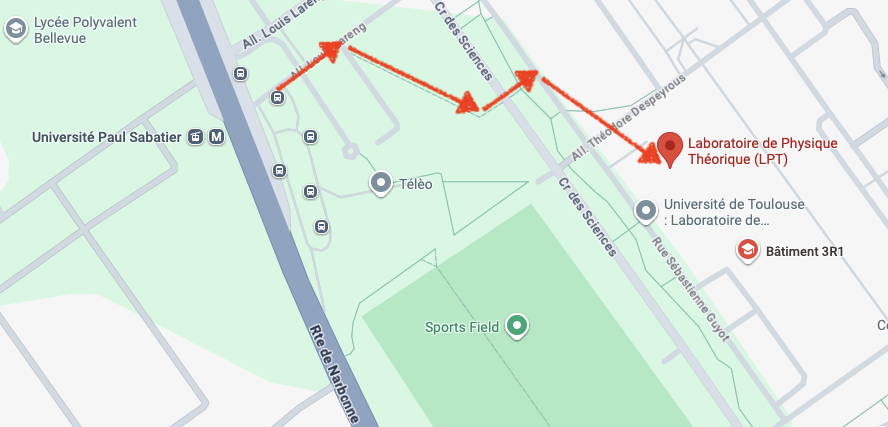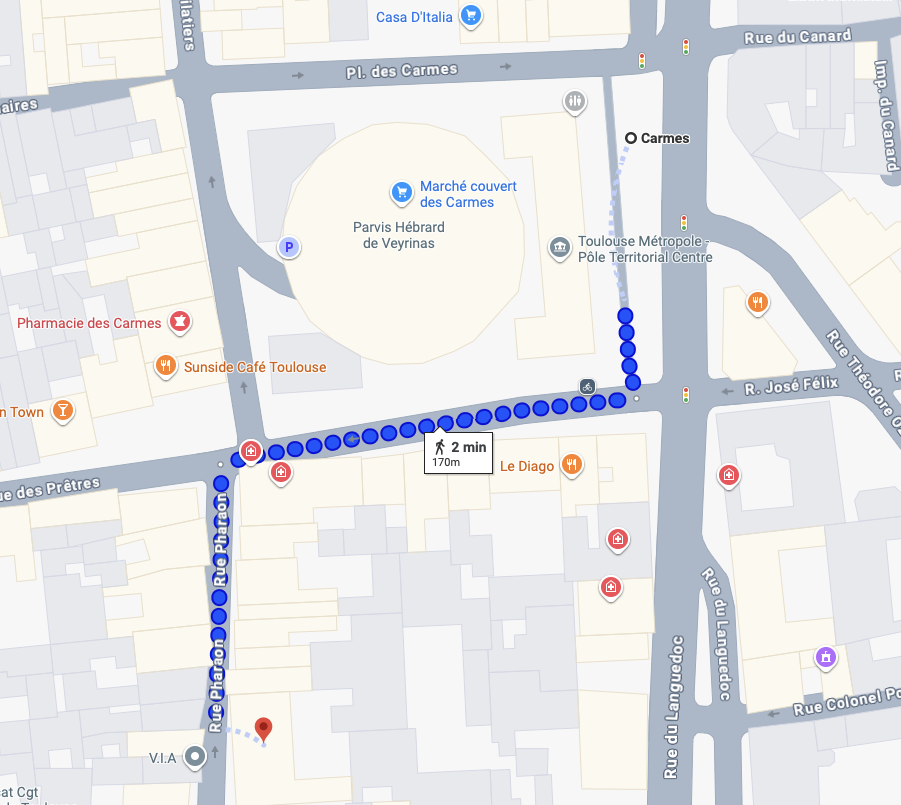Toulouse, Nov 26-28 2025
Organizers : P. M. Dinh and E. Suraud
Aim and objectives
Following the tradition of the previous successful meetings that have started in 2009, the Theory Days workshop aims at stimulating constructive discussions, collaborations, and knowledge exchange among a selected group of theoreticians. This year, the 17th edition will be dedicated to “Ehrenfest Dynamics and beyond”.
The coupling of electrons to ionic degrees of freedom is a central issue for the global understanding of dynamics in molecules and clusters. This is especially true in the case of dynamical scenarios far off equilibrium such as those experienced during irradiation processes by a laser or via the interaction with a swift charged projectiles. While short time dynamics may usually be safely analysed overlooking ionic dynamics, the account of the latter cannot be omitted on longer time scales. This is thus essential to properly account for the coupling of electrons to ions during the whole dynamical evolution in order to reach a complete description for example of irradiation scenarios. This is clearly a must go to theory approaches but it is also crucial to link modelling to experimental results which are often attained on time scales much larger than the explored processes themselves.
Usual treatments of electron dynamics couple to ions in an “average way” often loosely quoted “Ehrenfest dynamics”. Ehrenfest dynamics may be sufficient to address some classes of dynamical scenarios but is well known to suffer from potentially severe defects in some other situations, for example when bifurcations take place. These defects are known since long and numerous methods have been developed over the years to overcome (some of) these difficulties. The aim of the workshop is to discuss state of the art of some of these methods developed to overcome limitations of standard Ehrenfest dynamics. Recent developments will be particularly addressed, in particular to the extent that increasing computational power allows more and more ambitious and realistic complete treatment of dynamics.
We plan to gather people from various groups working in this domain, mostly in western Europe. The workshop is intended to be a working forum, thus rather informal. The format will consist in a series of long detailed talks, typically 1 hour (40 mn talk + 10 mn for questions) focusing in particular on ongoing problems and open issues. We thus urge participants to prepare their talks in this spirit. Ultimately a most efficient organization would consist in having a limited number of talks per representative group in order to avoid doublings.
Scientific program and Venue
The meeting will take place from Wednesday November 26th to Friday November 28th. It will be a hybrid event. Teams or zoom links will be provided below soon. The venue will be in the seminar room of the 3R1 building (3rd floor), see location https://maps.app.goo.gl/3zHVtwu4uvv5VYSS7).
Wednesday Nov 26th 2025
- 2pm-3pm: Hassan Abdoul-Carime, Institut des 2 infinis de Lyon, Université Claude Bernard, Lyon, France
- Title: Low energy (<10 eV) electron – molecule collision and applications
- https://cnrs.zoom.us/j/99600053646?pwd=ag60bOHebshFgArpk420QH98Sobppa.1
- 3pm-4pm: Davide Sangalli, Istituto di Struttura della Materia, CNR, Milano, Italy
- Title: Eherenfest dynamics within the TD-HSEX scheme: from the role of core electrons to exciton-phonon couplings
- https://cnrs.zoom.us/j/98254967165?pwd=We0tvh7bb1GKJFvk1kVGU2VThNslQZ.1
- 4pm-5pm: Tchavdar Todorov, School of Mathematics and Physics, Queen’s University of Belfast, Northern Ireland, UK (by visioconference)
- Title: Ehrenfest Dynamics: when it works and when it doesn’t
- https://cnrs.zoom.us/j/94648594791?pwd=CzedEs8XQyLf1IRJUd7TJgnIsw2PbF.1
Thursday Nov 27th 2025
- 10am-11am: Aurélien de la Lande, Institut de Chimie Théorique, Université Paris Saclay, Orsay, France
- Title: Current status of deMon2k for the simulation of radiolysis within biological and nano systems
- https://cnrs.zoom.us/j/94809829288?pwd=MtmmcIW9OZD8UbRb1QS6aPSLPaNHOc.1
- 11am-12am: Roberto Flores Moreno, Departamento de Quimica, Universidad de Guadalajara, Guadalajara, Mexico
- Title: Extension of conceptual DFT for multicomponent electron dynamics
- https://cnrs.zoom.us/j/95348883235?pwd=ioQELcNaHqFEfwyO1cvXH4bKPb7JS1.1
- 2pm-3pm: Spondon Sarma, Laboratoire de Physique et de Chimie Théoriques, Université de Lorraine, Vandoeuvre-lès-Nancy, France
- Title: Non-adiabatic dynamics near conical intersection: Spin separation via spin-orbit coupling
- https://cnrs.zoom.us/j/92037049447?pwd=sqDQHk6OhxITOk3NMNcbiGSC8Uex2n.1
- 3pm-4pm: Lea Maria Ibele, Institut de Chimie Radicalaire, Aix-Marseille Université, Marseille, France
- Title: Nonadiabatic dynamics in the vicinity of conical intersections: exact factorization and trajectory approaches
- https://cnrs.zoom.us/j/98956991354?pwd=91TerjYEjvtTfjyIp1AzcKbD8jg5Qq.1
- 4pm-5pm: Fernando Martin, Universidad Autónoma de Madrid, Madrid, Spain
- Title: Modeling the evolution of electronic coherences induced by ultrashort laser pulses with trajectory surface hopping
- https://cnrs.zoom.us/j/93530927104?pwd=Y2eJYPbLerWNKCz0zc0sYJqE4RboeN.1
Friday Nov 28th 2025
- 9am-10am: Paul-Gerhard Reinhard, Institute for Theoretical Physics, University Erlangen, Germany (by visioconference)
- Title: Analyzing the dipole instability in a solvable model
- https://cnrs.zoom.us/j/93993560846?pwd=FQZavvymmfXjcn3ayUYzcjsoYppnWl.1
- 10am-11am: Nicolas Tancogne-Dejean, Max-Planck Institute for the Structure and the Dynamics of Matter, Hamburg, Germany
- Title: Ehrenfest dynamics and beyond with Octopus
- https://cnrs.zoom.us/j/96419269729?pwd=ea7rBAIOzwMselZ20YJKxSDanpjVay.1
- 11am-12am: Jorge Kohanoff, Instituto de Fusion Nuclear, Universidad Politécnica de Madrid, Madrid, Spain
- Title: Electronic stopping from real-time TDDFT simulations: application to water systems
- https://cnrs.zoom.us/j/97267659046?pwd=1LQ6forCft5ZRVa8CY1tEMTaGZDau5.1
Access to Toulouse
Airports
Toulouse airport is connected to major west European airports and hubs (Paris Orly and Roissy Charles de Gaulle, Munich, Frankfurt, London, Amsterdam) with regular connections by Air France/KLM, Lufthansa, British Airways for the major companies and also with connections by (Low Cost) Easy Jet. Plane provides by far the simplest access to Toulouse with reasonable fees for sufficiently early booking.
There is a shuttle to downtown (first stop at Compans Caffarelli, on line B of metro) every 20 mn (cost is 8 euros for a one-way combined shuttle/metro ticket, no special fare for a return trip). As soon as one catches the shuttle, it takes about half an hour to get to the University, thanks to the connection with line B at Compans Caffarelli station (direction “Ramonville-Saint-Agne”, get off at station Université Paul Sabatier).
Train
Central station is Toulouse Matabiau connected to line A of the metro and is connected to major French cities. To go to the university, take metro line A towards Basso Cambo, get off at Jean Jaurès (1 stop from Marengo-SNCF station), change to metro line B towards Ramonville-Saint-Agne and get off at Université Paul Sabatier. It takes about 20-25 minutes.
Directions to the meeting venue
The meeting will take place in the seminar room of the 3R1 building, third floor, in the Laboratoire de Physique Théorique.
To reach the venue, follow the instructions below :
- Take metro line B, direction Ramonville Saint-Agne
- Get off at “Universite Paul Sabatier”
- Exit towards the university
- Follow the indications of the map below.

Dinners
The dinner on Thursday is organized at the restaurant La Cendrée, 11 rue des Tourneurs (hopefully inside the restaurant 😉 ) https://maps.app.goo.gl/uQm2LPhrgHdAzZL2A
Please meet there at 7:30pm.
The dinner on Wednesday is organized at the restaurant La Braisière, 42 rue des Pharaons, https://maps.app.goo.gl/igjqAUwepyyLjCrz8 . Please meet there a 7:30 pm. To get there, take metro line B, get off at the metro station Carmes and follow the directions below (2 min by walk).

